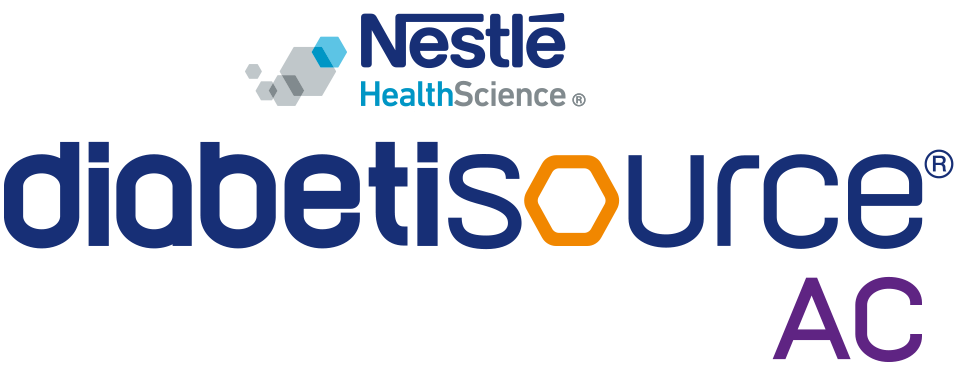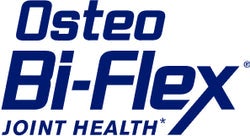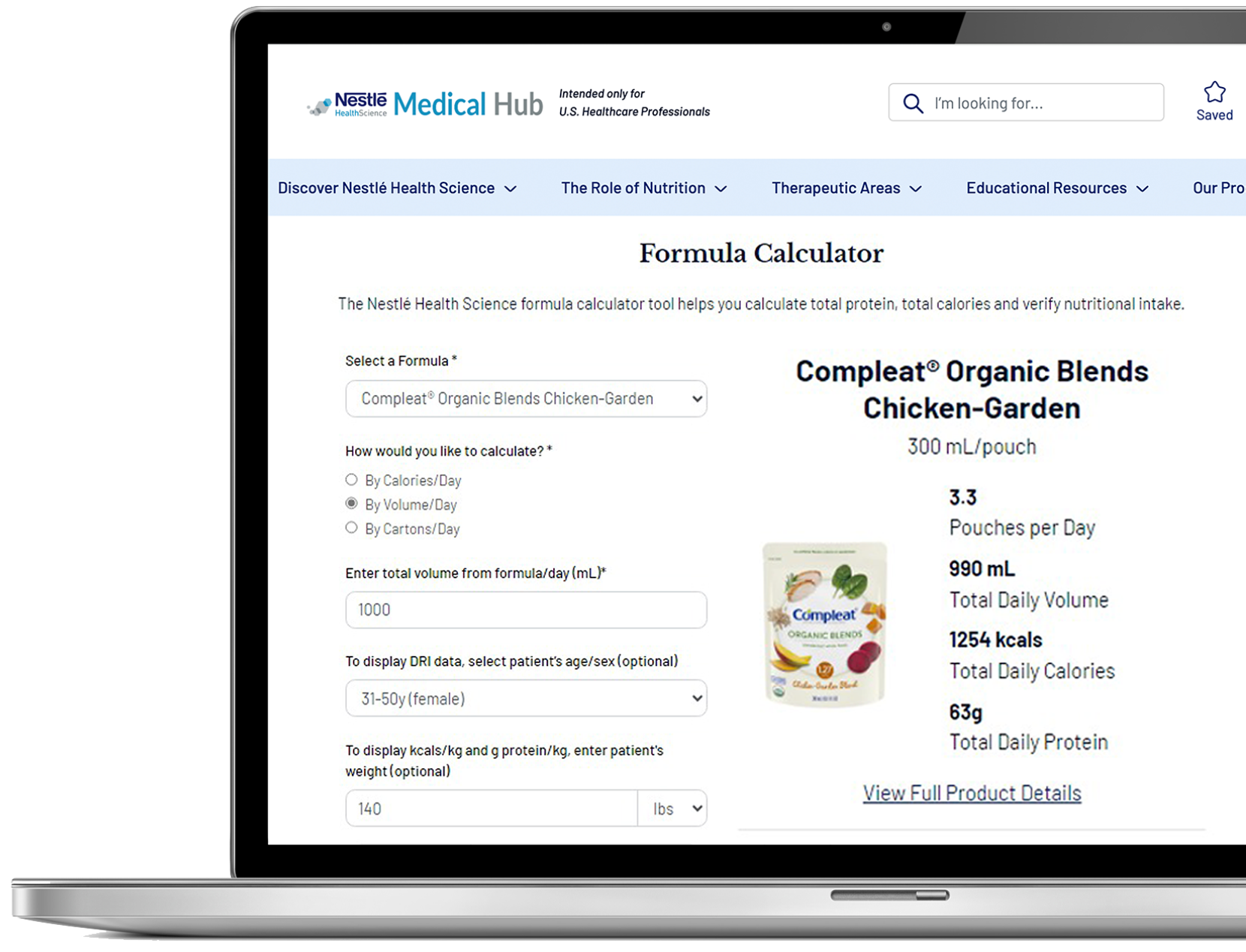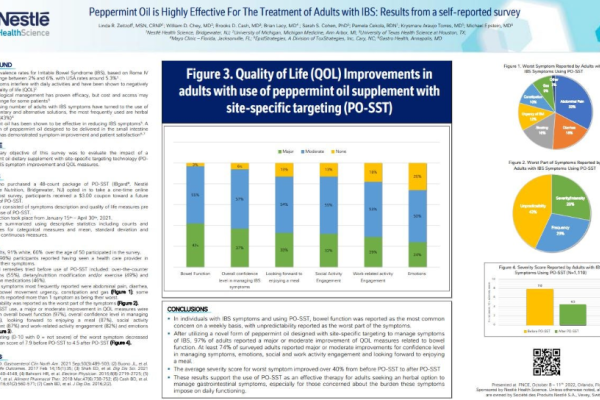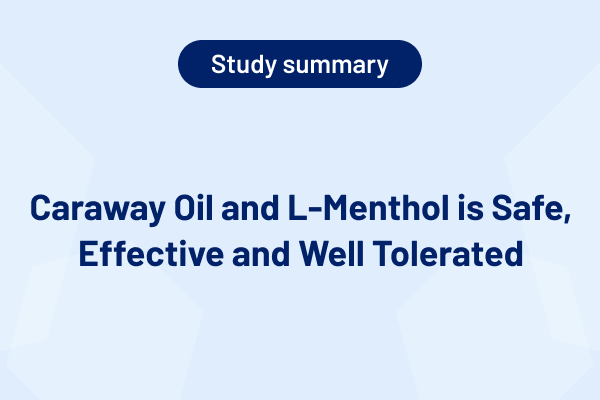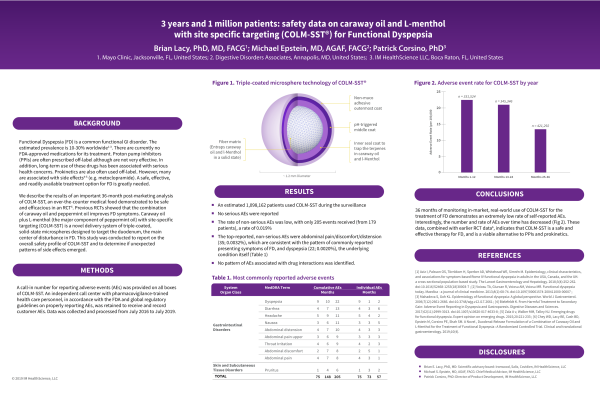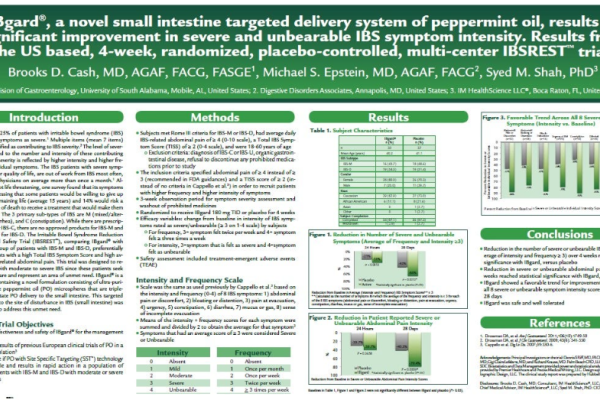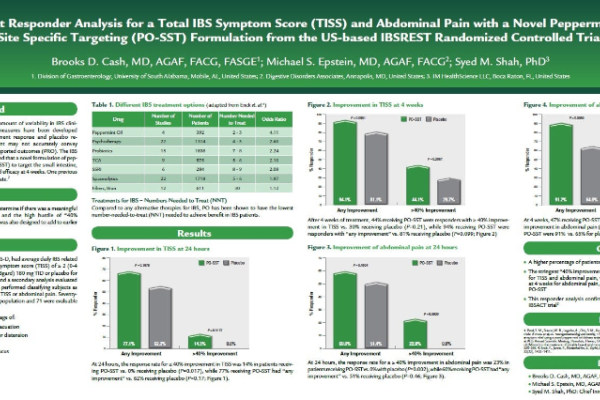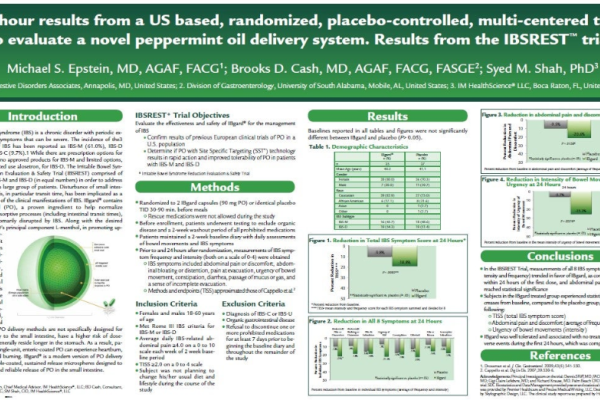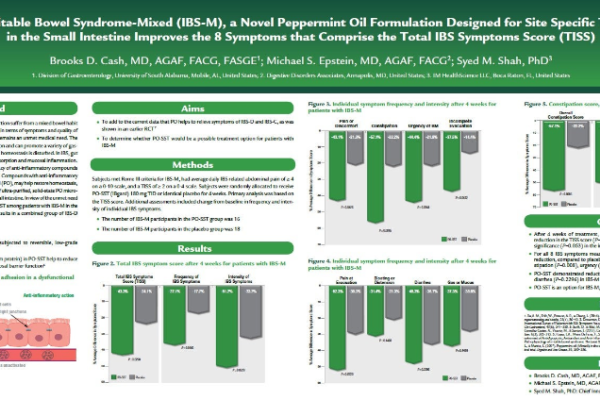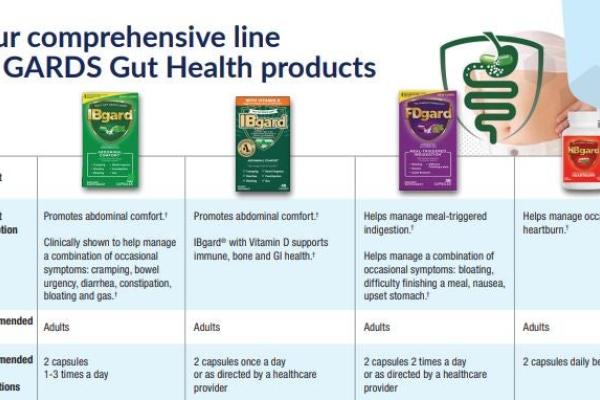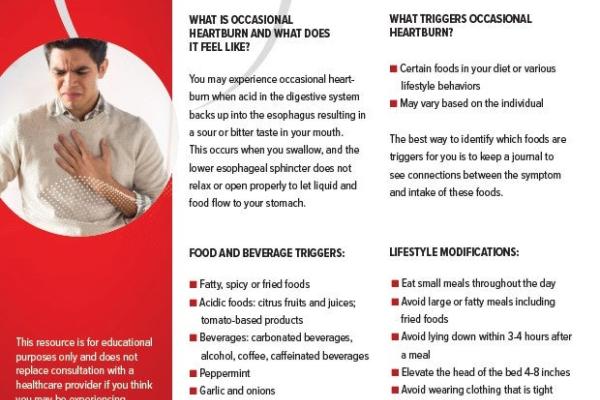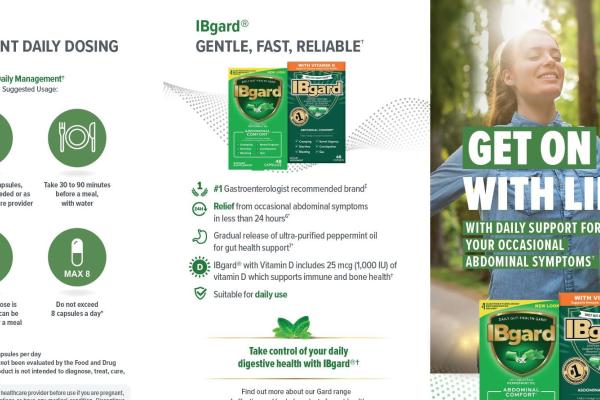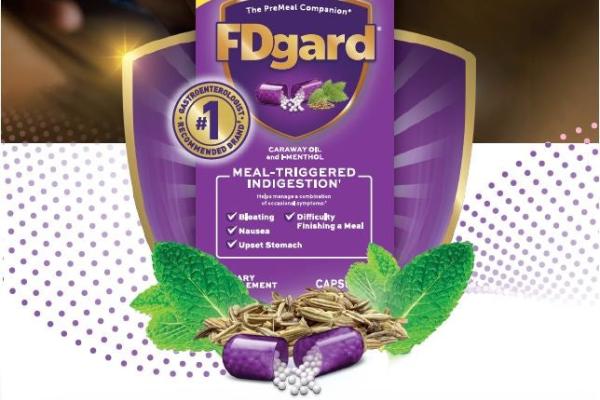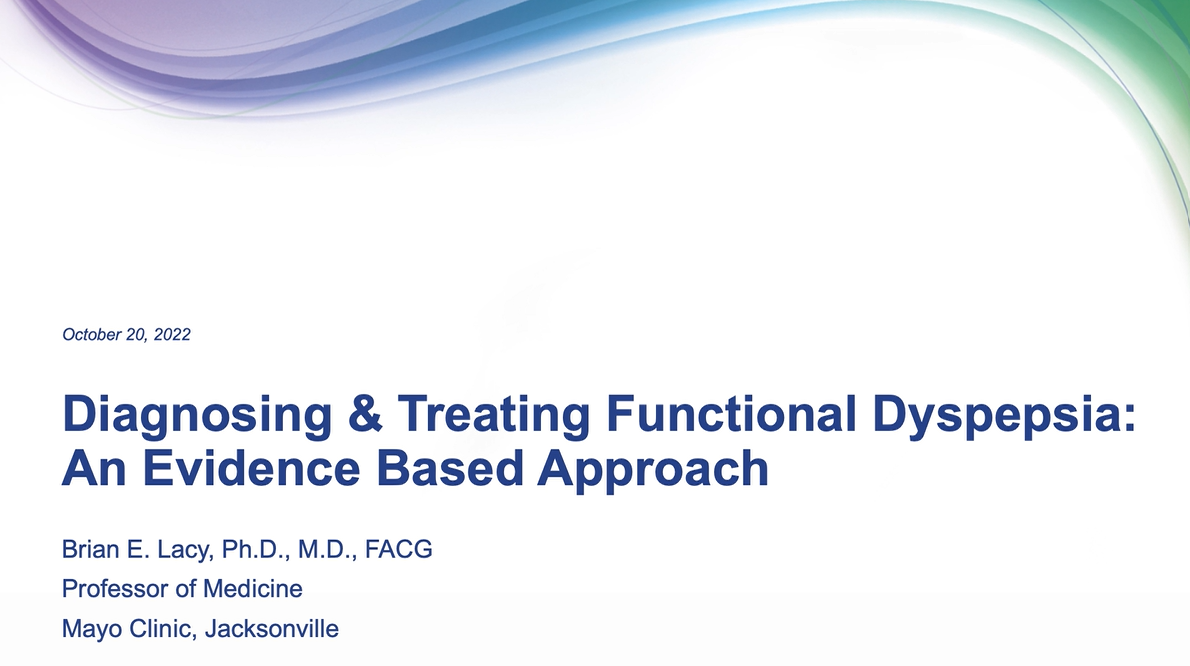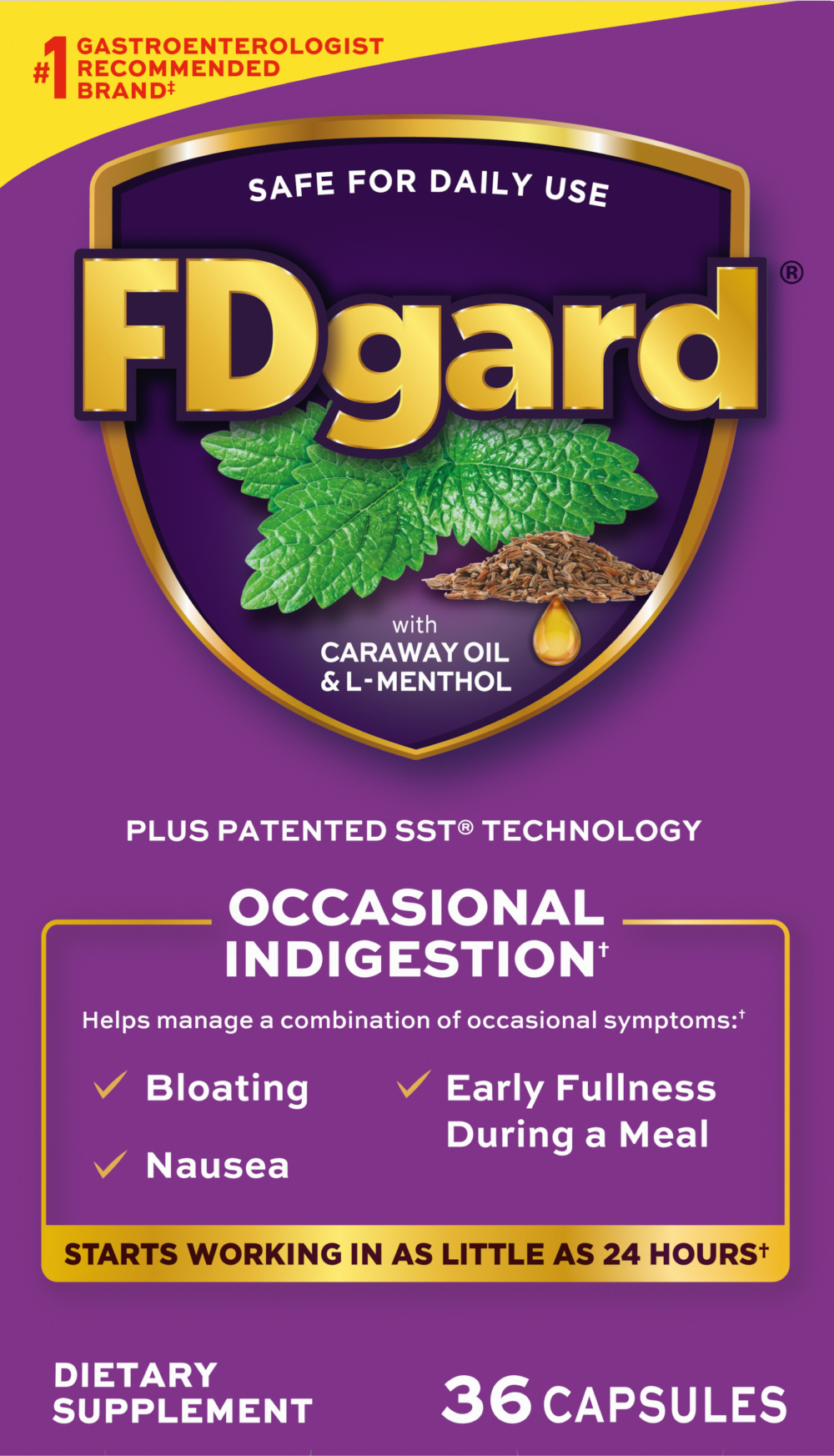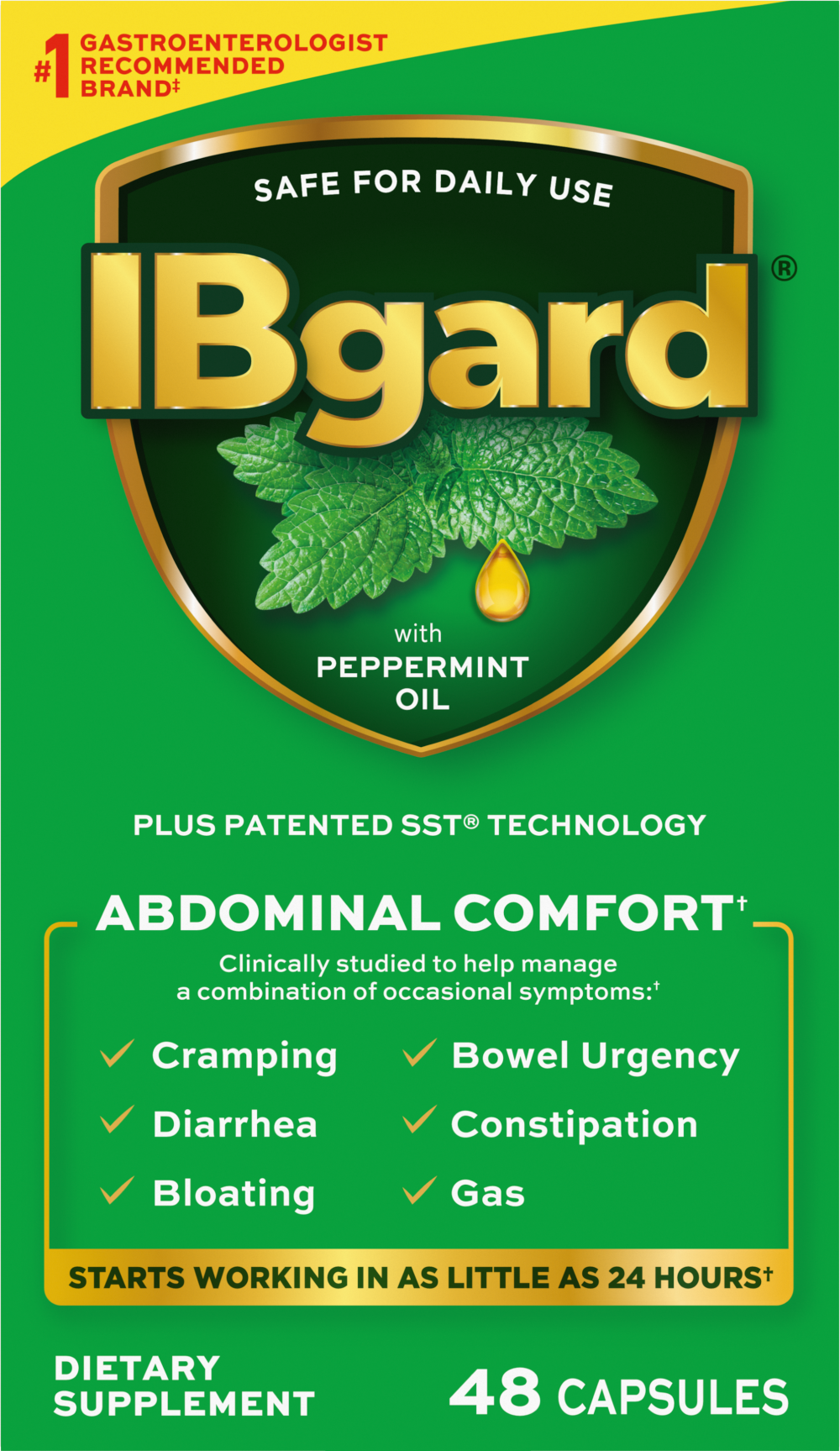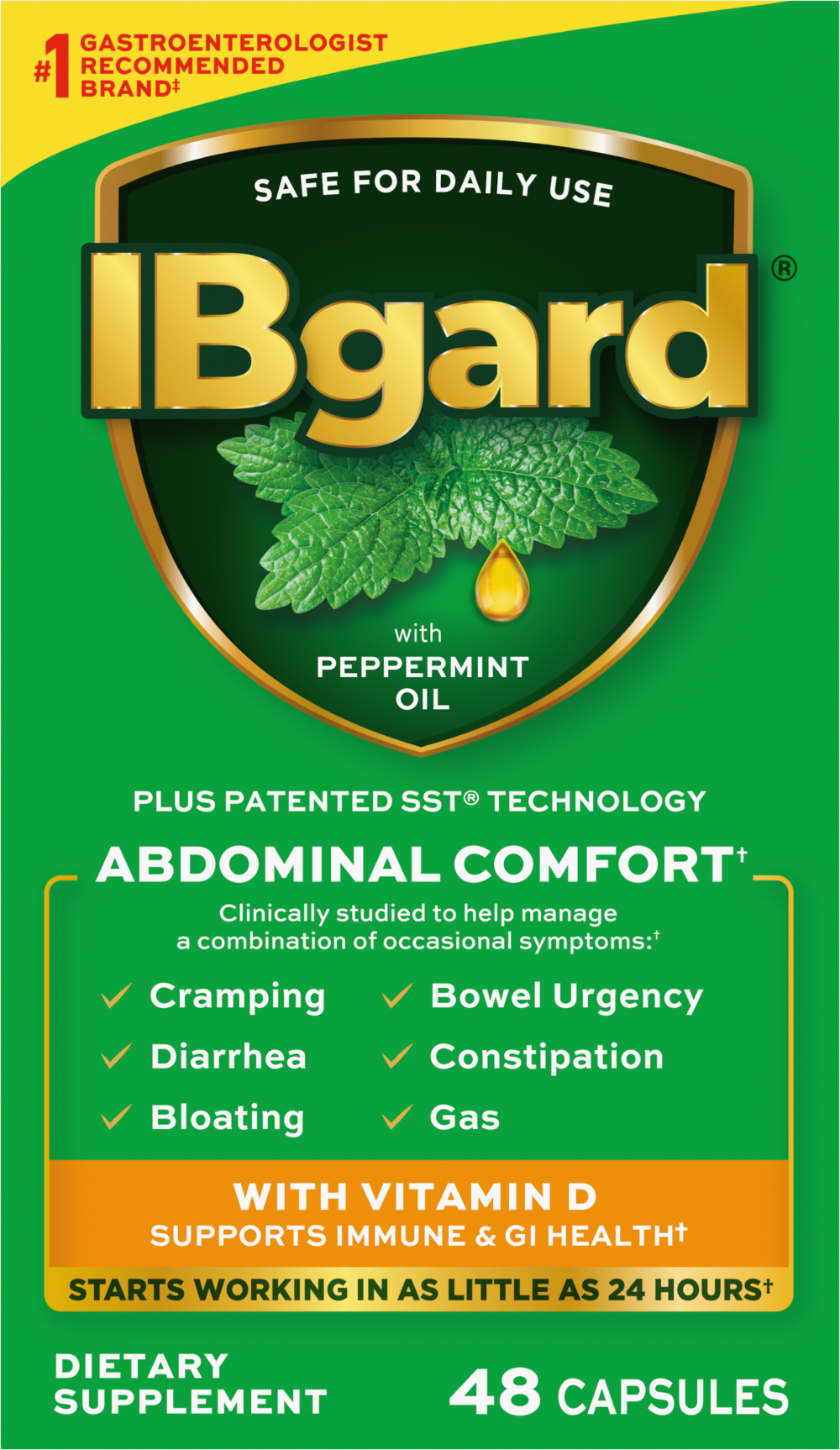About Digestive Health
Each patient comes with their own unique history, needs and preferences. However, their occasional digestive symptoms are more than mere disruptions in one’s day-to-day routine – they are often unpredictable, with the potential to impact one’s quality of life. 3
Some common symptoms associated with digestive discomfort may include: 1,2,4
- Bloating
- Constipation
- Diarrhea
- Heartburn
- Nausea
- Vomiting
- Abdominal discomfort
- Significant fluctuations in weight
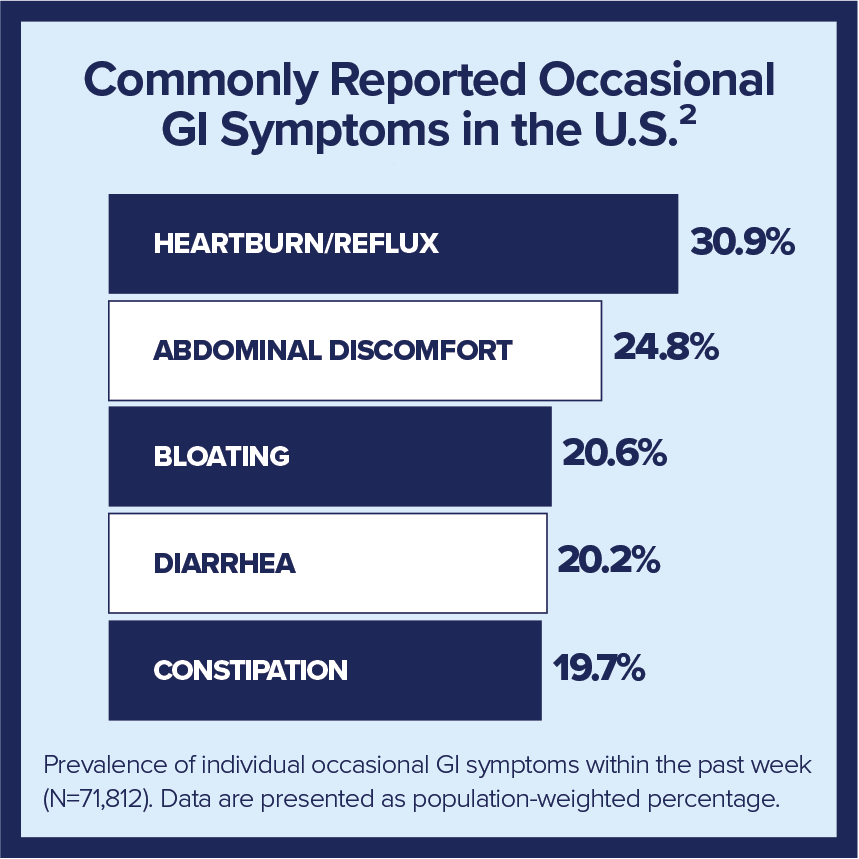
It’s important to make sure patients are transparent about their digestive health concerns to enable the most effective plan of action. Dietary guidance and education can be tailored to the unique symptoms of each individual. If necessary, diagnostic tests are available to help eliminate more serious concerns before landing on nutritional recommendations and guidance as a means to manage the occasional symptoms. The next step involves providing dietary guidance and patient-focused education to help relieve symptoms and support improved digestive health moving forward.
Healthcare professionals play an invaluable role in helping patients understand and manage their digestive health, and an interdisciplinary approach is key. Gastroenterologists, registered dietitians/nutritionists, primary care physicians, nurse practitioners, and/or radiologists may be involved in the patient care process.
Nutrition & Digestive Health
Nutrition plays a pivotal role in ensuring patients maintain optimal digestive health. First, proper nutrition can help with symptom management, alleviating occasional discomfort for those who cannot tolerate specific foods or ingredients. In addition, nutrition interventions can help address or prevent nutritional deficiencies and promote desirable weight gain after unintentional weight loss, as digestive issues are often linked to poor nutrient absorption. For those with malabsorptive gut issues, modifying the diet may even help improve the gut’s structural integrity.5
Nutritional Strategies for Digestive Health
Depending on the type of digestive health concern, the nutritional strategies and recommendations will vary. However, managing a patient’s individualized needs when it comes to diet and nutrition is critical for overall patient care in maintaining optimal gut health.
For example, a low-FODMAP diet (a diet low in fermentable oligosaccharides, disaccharides, monosaccharides, and polyols) has been shown to yield significant improvements in digestive symptoms.6 High-FODMAP foods to be avoided range broadly across food groups containing carbohydrates, such as foods like asparagus and avocados to soft cheeses and legumes.
Meanwhile, a gradual increase in consumption of foods with soluble fiber, like beans and apples, may improve symptoms related to occasional constipation, including straining, discomfort, stool consistency, and days without a bowel movement. 6
For those who have a difficult time tolerating gluten, the focus is on avoiding these gluten-containing foods, including wheat, barley, and rye. 7
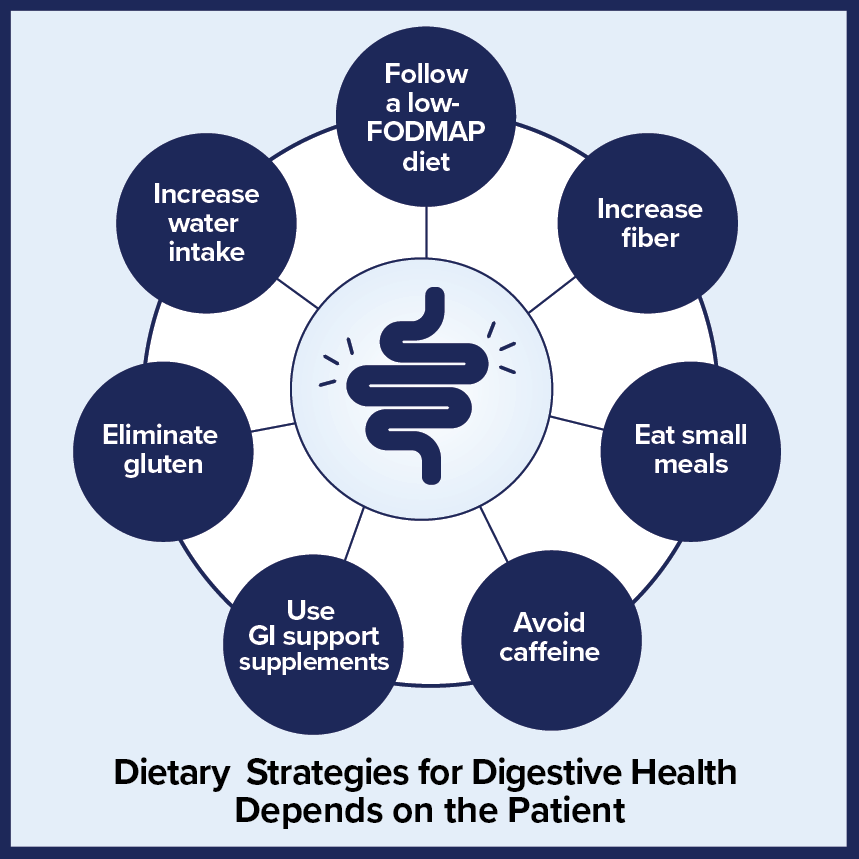
Dietary Supplements for Digestive Health
In addition to making dietary and behavioral changes, supplements offer patients additional management options. There are several types of dietary supplements designed to help address and alleviate occasional GI symptoms and discomfort while also maintaining optimal digestive health. †
- Prebiotics help support a healthy gut microbiome.† These are nondigestible fibers that help shape the microbial environment of the digestive tract. In addition to supplementation, prebiotic fiber can be found in several foods including oats, barley, onions, bananas, sourdough breads, kimchi, dairy products, and cereals.8
- Probiotics are beneficial bacteria that help support the balance of the gut microbiome and promote the growth of good bacteria.† Whether you choose probiotic supplements or probiotic-dense foods, they both play an important role in digestive health. † Studies have shown that probiotics can help alleviate a variety of GI symptoms and support overall health.†9
- Peppermint oil may offer effective benefits for the management of occasional gas and other GI health concerns.† That’s because peppermint oil helps to relax the digestive system and manage occasional symptoms in the gut.† Research has also shown it to be a supplement that has been used successfully – by thousands of patients experiencing symptoms related to the digestive tract.10
- Digestive enzymes are proteins that help the body digest and absorb nutrients† For example, lactase, a more commonly known digestive enzyme, can be taken orally to supplement the body’s natural digestive processes that help break down bothersome dairy components. Many other enzymes help break down macronutrients like fat, carbohydrates, and proteins, and can also be taken in supplement form.12
Although there is no one-size-fits-all solution for managing digestive symptoms, patients struggling with periodic digestive discomfort or more may benefit from dietary supplements specifically formulated to help support gut health and manage symptoms when they occasionally come up. † To view all digestive health supplements, click here.
† These statements have not been evaluated by the Food and Drug Administration. This product is not intended to diagnose, treat, cure, or prevent any disease.
Support Resources
You must be logged in to view all resources.
10 Evidence Found
4 Tools and Product Support Found
3 Patient Resources Found
11 Videos
References
- National Institutes of Health, U.S. Department of Health and Human Services. Opportunities and Challenges in Digestive Diseases Research: Recommendations of the National Commission on Digestive Diseases. Bethesda, MD: National Institutes of Health; 2009. NIH Publication 08–6514
- Almario CV, Ballal ML, Chey WD, Nordstrom C, Khanna D, Spiegel BMR. Burden of Gastrointestinal Symptoms in the United States: Results of a Nationally Representative Survey of Over 71,000 Americans. Am J Gastroenterol. 2018 Nov;113(11):1701-1710. doi: 10.1038/s41395-018-0256-8. Epub 2018 Oct 15. PMID: 30323268; PMCID: PMC6453579.
- Ballou S, McMahon C, Lee HN, Katon J, Shin A, Rangan V, Singh P, Nee J, Camilleri M, Lembo A, Iturrino J. Effects of Irritable Bowel Syndrome on Daily Activities Vary Among Subtypes Based on Results From the IBS in America Survey. Clin Gastroenterol Hepatol. 2019 Nov;17(12):2471-2478.e3. doi: 10.1016/j.cgh.2019.08.016. Epub 2019 Aug 13. PMID: 31419572; PMCID: PMC7675784.
- Digestive Diseases. Medline Plus. Updated October 27, 2021. Accessed September 12, 2023. https://medlineplus.gov/ency/article/007447.htm
- Conlon MA, Bird AR. The impact of diet and lifestyle on gut microbiota and human health. Nutrients. 2014 Dec 24;7(1):17-44. doi: 10.3390/nu7010017. PMID: 25545101; PMCID: PMC4303825.
- Corsello A, Pugliese D, Gasbarrini A, Armuzzi A. Diet and Nutrients in Gastrointestinal Chronic Diseases. Nutrients. 2020 Sep 3;12(9):2693. doi: 10.3390/nu12092693. PMID: 32899273; PMCID: PMC7551310.
- Gluten-Free Foods. Celiac Disease Foundation. Accessed on 9-19-23. https://celiac.org/gluten-free-living/gluten-free-foods/
- Carlson JL, Erickson JM, Lloyd BB, Slavin JL. Health Effects and Sources of Prebiotic Dietary Fiber. Curr Dev Nutr. 2018;2(3):nzy005. Published 2018 Jan 29. doi:10.1093/cdn/nzy005 https://www.ncbi.nlm.nih.gov/pmc/articles/PMC6041804/
- Bodke H, Jogdand S. Role of Probiotics in Human Health. Cureus. 2022 Nov 9;14(11):e31313. doi: 10.7759/cureus.31313. PMID: 36514580; PMCID: PMC9733784.
- Chumpitazi BP, Kearns GL, Shulman RJ. Review article: the physiological effects and safety of peppermint oil and its efficacy in irritable bowel syndrome and other functional disorders. Aliment Pharmacol Ther. 2018;47(6):738-752. doi:10.1111/apt.14519
- Mahboubi M. Caraway as Important Medicinal Plants in Management of Diseases. Nat Prod Bioprospect. 2019 Jan;9(1):1-11. doi: 10.1007/s13659-018-0190-x. Epub 2018 Oct 29. PMID: 30374904; PMCID: PMC6328425.
- Ianiro G, Pecere S, Giorgio V, Gasbarrini A, Cammarota G. Digestive Enzyme Supplementation in Gastrointestinal Diseases. Curr Drug Metab. 2016;17(2):187-93. doi: 10.2174/138920021702160114150137. PMID: 26806042; PMCID: PMC4923703.
† These statements have not been evaluated by the Food and Drug Administration. This product is not intended to diagnose, treat, cure, or prevent any disease.














